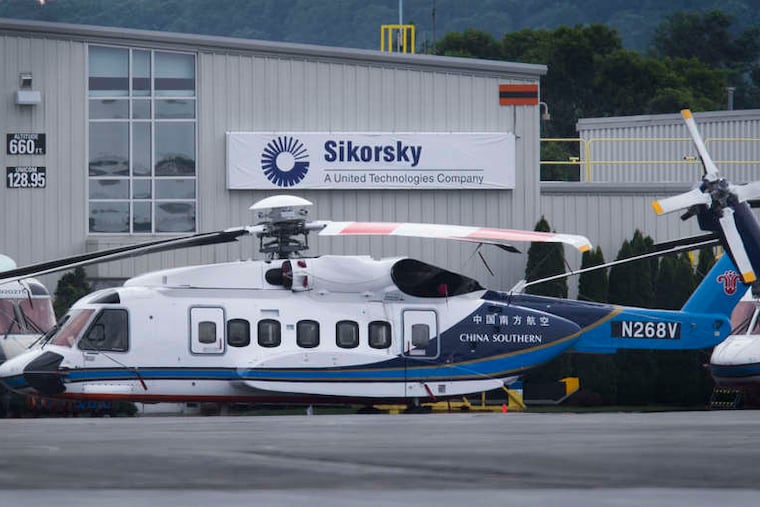White House helicopters not enough to save Sikorsky plant in Coatesville and its 465 jobs
Sikorsky had hoped that the oil and gas market would have rebounded by now, but it has not, causing the company to close the plant.

The next White House helicopters, scheduled to zoom President Donald Trump to reelection rallies, golf clubs, disasters and state occasions when it replaces the current fleet of Marine One airships starting next year, are among the last craft that Lockheed Martin plans to build at its Sikorsky Aircraft plant west of Coatesville, where the military contractor once hoped to anchor a growing civilian business.
The limited-edition militarized White House version of Sikorsky’s VH-92 aircraft won’t keep Coatesville busy past year’s end, Sikorsky president Dan Schultz wrote in a letter to the local freshman U.S. Rep. Chrissy Houlahan (D., Chester County), a former Air Force lieutenant. The company told the site’s 465 workers last week of its plan to shut the nonunion plant.
In 2014, the company accepted a $2.5 million state matching grant to improve the Sikorsky complex, betting on rising civilian helicopter orders, especially from energy-exploration companies.
“Our hope, a few years ago, was that the oil and gas market would have rebounded by now, but it has not,” Schultz wrote to the congresswoman.
“By the end of 2019, Coatesville will complete the first six” of the small production run — but the next six will be built at the company’s plant in Stratford, Conn., where the civilian model for the helicopter was first produced, Schultz added.
Houlahan said she has urged Sikorsky to consider Coatesville for upgrades and parts production for its MH-60 Sea Hawk helicopters, and for some of the CH-53K King Stallion helicopters that the Marines use for heavy lifting -- same approximate mission as Boeing’s Chinook, but smaller and with one rotor, because Marines travel lighter than Army.
Houlahan said her staff spoke Tuesday morning with the Chester County Chamber of Commerce and county and private-sector officials, and is reaching out to the area’s helicopter, railroad, and bus suppliers, about hiring Sikorsky veterans and using the plant complex if it becomes vacant on schedule. “We have a thriving economy in transportation supply chain areas and I hope we can be helpful,” she added.
At the same time, Houlahan has introduced a budget amendment in Congress that would force a review by the secretary of the Navy of the impact of shutting the Coatesville plant on production at Sikorsky plants in Alabama and New York as well as Connecticut. The amendment would also make continued funding of the White House helicopters conditional on completing the review, as if to keep the plant open a little longer.
“I would simply answer that this will be negligible," Schultz wrote to Houlahan. Suppliers already know there are few remaining orders to be filled and have already been shifting their resources away from new production to “spare parts and maintenance,” he added.
Schultz called the shutdown a “very difficult decision."
Lockheed Martin says about 75 Coatesville engineering and support jobs will move to Lockheed Martin offices in King of Prussia, and 70 to its works in Owego, N.Y. The company plans to sell the Coatesville building it calls the Heliplex and will leave two neighboring buildings as leases expire later this year.
Sikorsky is the smallest and newest of the helicopter manufacturing plants in the Philadelphia area. The Boeing military helicopter plant in Ridley Township, Delaware County, employs around 4,600, including members of the Machinists union, many of whose future employment at the plant will depend on reversing the Army’s recent decision to cut back upgrades of Chinook helicopters in favor of newer weapons systems.
The nonunion, Italian-owned Leonardo factory in Northeast Philadelphia, which is preparing to sell a militarized version of one of its civilian models to the U.S. Air Force in a partnership with Boeing, has been expanding and expects to employ over 700 by the end of the year, its Philadelphia CEO, Bill Hunt, said recently.
The plants also buy from local suppliers, including makers of seats, insulation, electrical equipment, and other helicopter systems and parts.